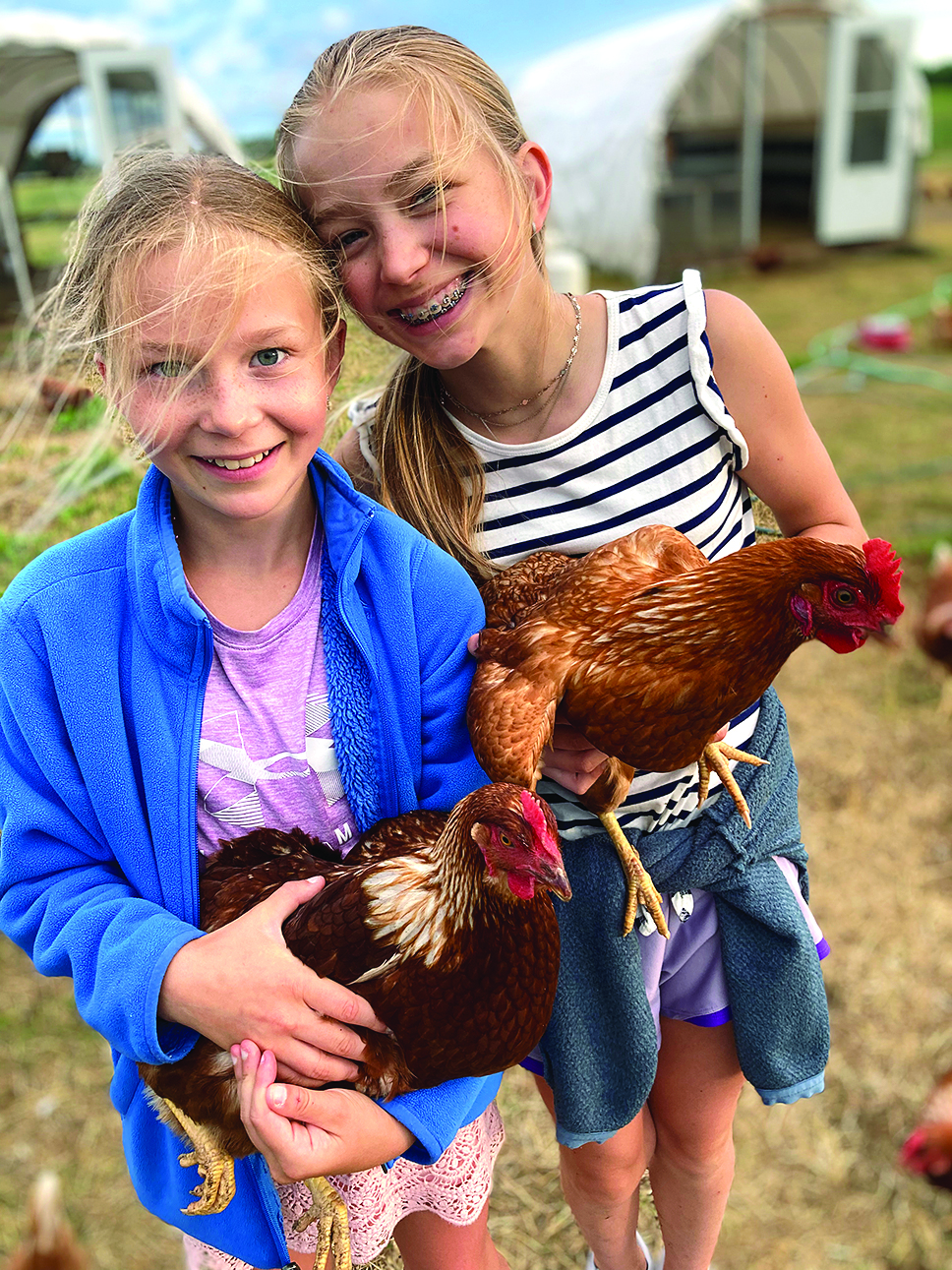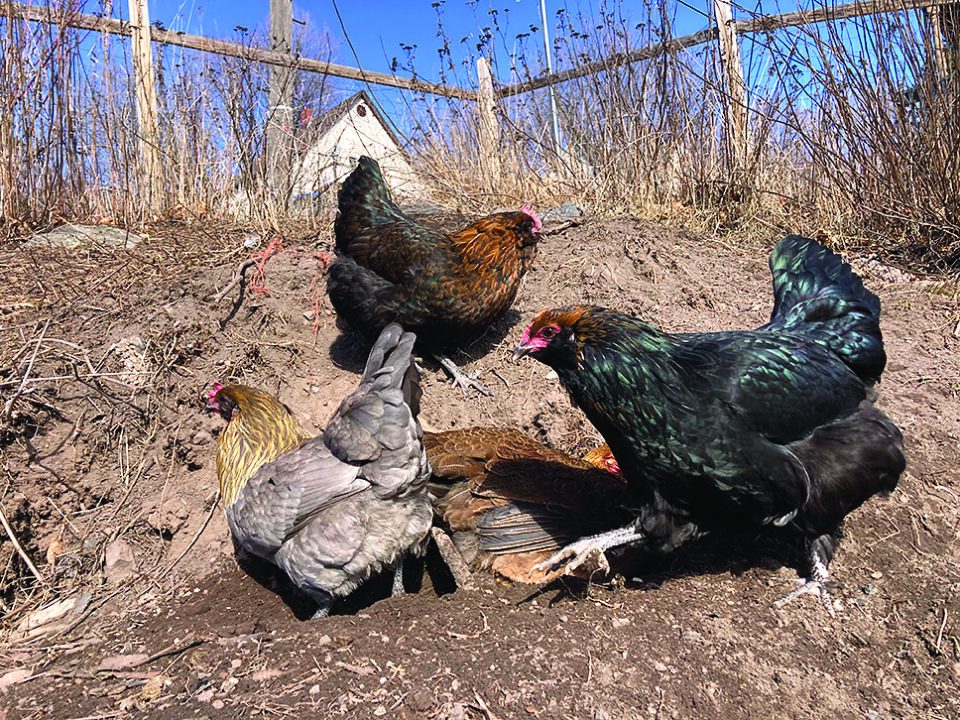Duluth is prime territory for “urban farming.” Sure, it’s a trendy, catchy phrase. But growing your own food isn’t just “hip”—it’s a universal human instinct. Urban farming makes our lives more real, as we encounter all the challenges and adversity that raising our own food entails. A successful harvest gives you independence from the grocery store. One of the simplest, most productive ways to get started urban farming is to raise backyard chickens. Here are five things to know for keeping your own flock.
The Backyard
The city of Duluth has a five-page “License Application” for raising chickens, available online. There you’ll find plenty of guidelines for raising chickens in town. The basics: pay $12 a year to the city clerk (only half the price of a fishing license), raise no more than five chickens, and don’t keep roosters. You’ll also need a backyard—chickens may not be raised in your home. Finally, when installing a backyard coop, you don’t need a building permit if the coop is under 120 square feet.
Duluth is full of spread-out neighborhoods with ample yard space. The sprawling city is begging for urban farmers to give it a go. If you’re willing to sacrifice some lawn, or convert your “back 40” into a space for domesticated animals, you can satisfy the first prerequisite for raising chickens.
The Benefits
Two local legends—Jason and Lucie Amundsen—took the humble dream of backyard chicken ownership and have turned it into one of northern Minnesota’s most recognizable food brands: Locally Laid Egg Company. The Amundsen family started raising backyard chickens in Duluth’s Central Hillside neighborhood, and today serve more than 200 markets in Minnesota and Wisconsin.
Still, Jason says raising chickens isn’t all about economics. Jason recounts some of the other benefits: “Raising chickens is like free TV. You get to watch the chickens run around. It’s free entertainment. It’s not all about eggs. You’re learning something in the process. You’re providing care. That’s an intangible that you can’t really monetize, but it has value.”
Of course, most chicken owners are motivated at least in part by the daily fresh eggs. Homemade waffles, baked goods, or frittatas will always be tastier with eggs from your backyard flock. Chickens start laying eggs at six months old, and can lay up to six eggs a week, with peak production lasting two years.
Laura Whittaker, who’s been raising chickens for 10 years on Observation Hill in Duluth, describes the satisfaction: “There’s that farm-to-table, real understanding of where your food comes from. It’s so good for my family, and it’s so grounding.”

Another obvious benefit to raising chickens is the connection to nature. “When you go down to the coop, the chickens are talking to you, and they all have their own personalities,” explains Whittaker. “I love that part of having chickens. Just that relationship with where your food comes from.”
Spring Babies
For a next-level experience, try hatching chicks at home to start your flock. Now’s the season!
Whittaker shares the process: “We order eggs from Strombergs, and we set the ship date so that the incubation period will finish at the right time for getting the chicks out into the coop. You’re notified when they ship, and usually you get a very exciting call from the post office within 24 to 48 hours.”
But even before that, get your incubator going 72 hours ahead of delivery. “You have to get just the right temperature and humidity ahead of time,” says Whittaker. “Then we mark the eggs with an X, and put the X facing up. The eggs turn every 45 minutes to an hour. It’s super fascinating.”
Once you get the eggs in the incubator, you don’t want to go back in. “It’s a self-turning incubator, so we don’t have to open it and put our hands in, which could introduce germs, and change the temperature and humidity,” Whittaker adds.
Finally, after 19 days, Whittaker says you’ll see the eggs start “rocking and rolling.”
“It’s very important that the incubator stop turning at that point, because the chicks have to get in the right position. They have to have their beaks tucked below their wing, so that their egg tooth has the right physics to be able to scrape at the lining of the egg, and then crack through,” Whittaker notes.
Chicks should hatch in 21 days after they start in the incubator.
Prepping for Winter
Our family started raising backyard chickens in the spring of 2023, and we anticipated that the hardest task would be to keep the chickens from freezing in winter, but this winter was a breeze.
Jason suggests not heating the coop anyway. “The most important thing for the backyard flock keeper is to not heat the structure. Instead, focus on keeping the chickens out of the wind, with good ventilation. As long as they’re out of the wind, with good ventilation, they’ll be fine. Heating is not just a giant expense, but also a giant fire hazard. There’s no need to heat the coop.”
Easy Routines
Raising chickens is not a big time commitment. You’ll need to let the birds out of the coop each morning, and put them back in each evening. You’ll need to clean the coop about once a week (use pine shavings from your local feed bin to minimize clean-up time). Beyond that, food and water don’t even have to be replenished each day. “I will over-eat, but chickens generally speaking won’t,” Jason jokes. “You don’t need to ration their food—the chickens will ration it themselves.”
For a preview of what raising chickens involves, check out the Amundsens’ AirB-N-Bawk. That’s right, these “chicken aquariums” are designed so that you sleep with the chickens. “You literally bunk with the birds,” says Jason. “There’s just a piece of glass between you and the chickens.” The idea might sound crazy, but it’s popular.
If you like cooking with eggs, want to teach your kids about nature, or just want to gain greater food autonomy, give backyard chickens a shot.






